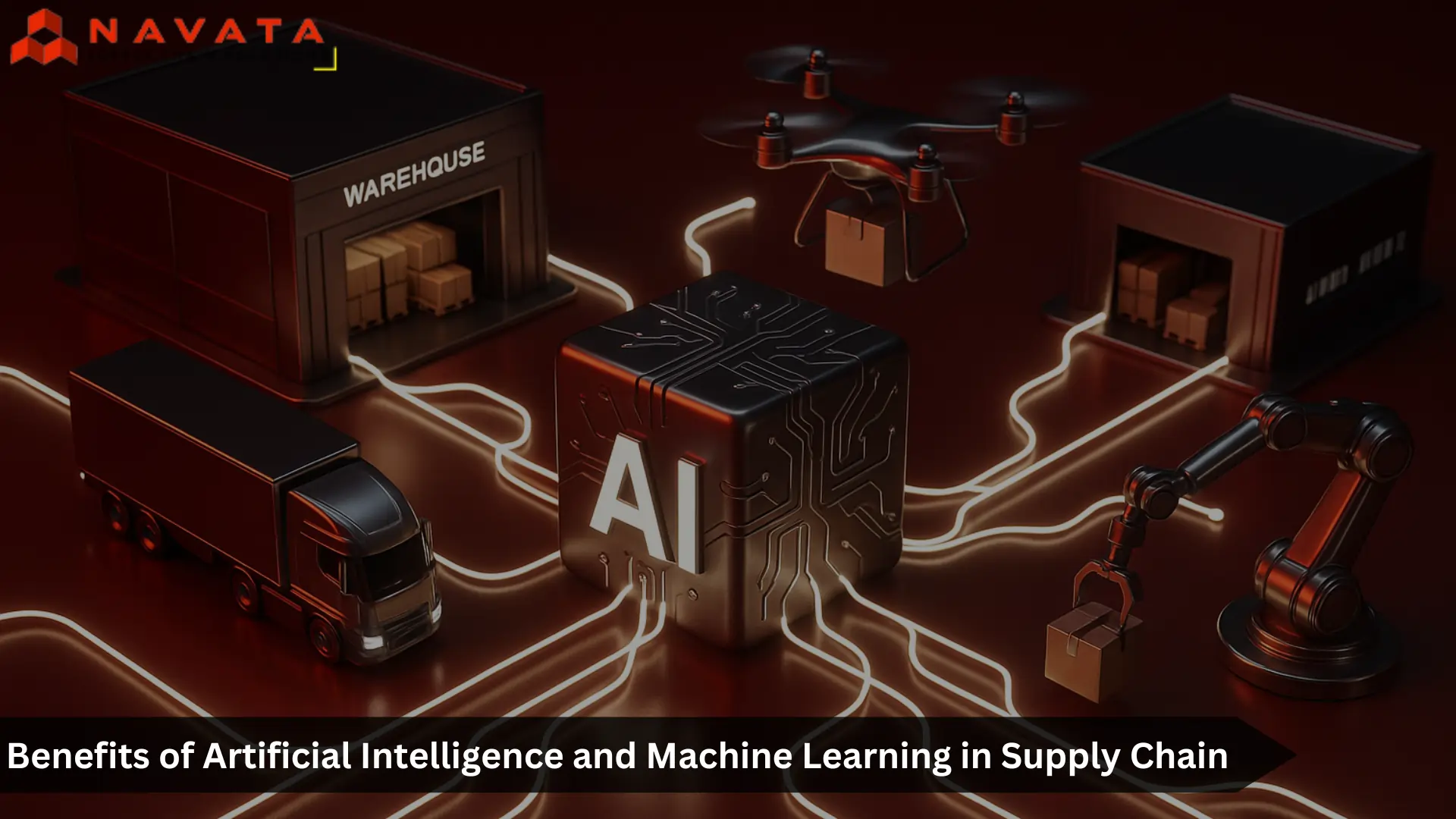Benefits of AI and ML in Supply Chain
The global supply chain ecosystem is evolving rapidly, and the integration of Artificial Intelligence (AI) and Machine Learning (ML) has become essential for staying competitive. These technologies empower logistics providers to move from manual operations to predictive, data-driven supply chain management — improving visibility, accuracy, and responsiveness.
From AI-driven demand forecasting to autonomous warehouse operations and real-time logistics optimization, AI and ML are reshaping how goods move, how risks are managed, and how customer expectations are met with speed and precision.

1. AI-Driven Demand Forecasting for Inventory Optimization
Traditional forecasting methods often fail to capture sudden market fluctuations. With AI-powered data & analytics, businesses can forecast demand with far greater accuracy by processing large volumes of data — including sales history, weather patterns, and regional buying behavior.
Impact:
Prevents overstocking and stockouts
Improves working capital efficiency
Reduces waste and inventory holding costs
AI-driven demand forecasting helps supply chains become more responsive and cost-efficient by anticipating change before it happens
2. Intelligent Route Optimization and Last-Mile Delivery Efficiency
In logistics, the last mile is often the costliest and most unpredictable segment. Machine learning algorithms can analyze real-time data such as traffic, weather, and delivery density to determine the most efficient routes.
Impact:
Reduces fuel consumption and carbon emissions
Enhances on-time delivery rates
Lowers overall transportation costs
By combining data intelligence with automation, AI makes last-mile delivery not just faster — but smarter and more sustainable.
3. Predictive Maintenance for Fleet and Equipment Reliability
AI-based predictive maintenance systems continuously monitor data from IoT-enabled sensors on trucks, conveyors, and warehouse robots. ML models detect early warning signs of wear or malfunction before breakdowns occur.
Impact:
Minimizes unplanned downtime
Extends asset life
Reduces costly emergency repairs
Predictive maintenance powered by AI ensures logistics assets run longer, safer, and more efficiently — keeping supply chains moving without interruption.
4. Enhanced Supply Chain Visibility and Risk Mitigation
AI systems consolidate real-time data from suppliers, transporters, and distributors to create a unified view of the supply chain. With AI-powered risk analytics, companies can simulate disruption scenarios such as port delays, geopolitical risks, or raw material shortages — and proactively plan alternatives.
Impact:
Improves decision-making
Increases resilience to disruptions
Enables agile supply chain planning
AI-driven visibility turns uncertainty into insight, giving businesses the agility to respond before disruptions escalate.
5. Warehouse Automation and Smart Robotics
AI and ML are transforming warehouses through robotic process automation (RPA), autonomous mobile robots (AMRs), and AI-based picking systems. These systems improve accuracy and speed in tasks like picking, packing, and sorting.
Impact:
Reduces human error
Speeds up order fulfillment
Enhances operational efficiency and scalability
Smart warehouses powered by AI are redefining speed, precision, and scalability across modern fulfillment networks.
Looking For AI Driven Solutions For Your Supply Chain!
6. AI for Sustainable and Green Logistics
AI helps optimize fuel routes, packaging materials, and energy use across logistics networks. By leveraging machine learning models for carbon tracking and route planning, companies can significantly reduce emissions while maintaining efficiency.
Impact:
Achieves sustainability goals
Lowers carbon footprint
Improves corporate ESG scores
AI-driven sustainability initiatives help businesses cut costs and carbon simultaneously — a win for both profit and the planet.
7. Personalized Customer Experience through Predictive Insights
AI enables logistics firms to offer personalized shipping options, real-time delivery tracking, and predictive ETA updates — improving end-customer satisfaction. ML models even predict customer preferences for better service-level planning.
Impact:
Enhances customer trust and loyalty
Improves delivery transparency
Supports data-driven service optimization
By aligning personalization with precision, AI turns logistics into a powerful driver of customer experience and brand loyalty.

Conclusion
The integration of AI and machine learning in supply chain management is no longer optional — it’s a competitive necessity. Companies leveraging these technologies gain predictive intelligence, operational agility, and data-driven precision to navigate today’s volatile logistics environment.
As technology advances, the future supply chain will not just be automated — it will be self-optimizing, resilient, and sustainable.
Thanks For Reading: Benefits of Artificial Intelligence and Machine Learning in Supply Chain
Powered By 360Presence

